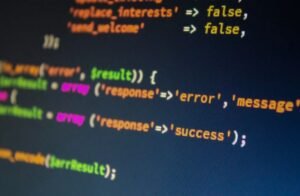AI Movie Meaning
Artificial Intelligence (AI) has become an increasingly popular topic in the world of movies. From thought-provoking science fiction films to action-packed blockbusters, AI is often portrayed in various roles and scenarios, raising questions about its impact on society, ethics, and the future of humanity. In this article, we will explore the meaning behind AI in movies and how it reflects our own perceptions and advancements in technology.
Key Takeaways
- AI is a prevalent theme in movies, illustrating its potential impact and consequences.
- AI movies often explore questions of ethics, technology, and the nature of humanity.
- They reflect society’s fascination with AI and serve as a platform for exploring future possibilities.
AI movies provide thought-provoking narratives that engage audiences and challenge our perceptions of technology, consciousness, and the human condition. These films often depict AI systems with *extraordinary capabilities*, engaging in various roles such as benevolent companions, malevolent overlords, or subjects of scientific curiosity. Through their storytelling, AI movies offer insights into our own hopes, fears, and desires about the future of technology.
AI movies delve into profound philosophical questions such as *what it means to be human* and *the ethical impact of creating intelligent machines*. They explore themes like agency, consciousness, and the blurred boundaries between humans and machines. These films often depict dilemmas that arise when AI is tasked with making moral decisions or when humans become emotionally attached to AI entities. The narratives serve as a catalyst for discussions on the ethical implications of AI development.
AI Movies and Insights
Let’s take a closer look at some notable AI movies and the insights they provide:
| Movie Title | Year Released | Main AI Character |
|---|---|---|
| Ex Machina | 2014 | Ava, a highly advanced humanoid AI |
| Blade Runner | 1982 | Roy Batty, a replicant with AI |
In “Ex Machina,” Ava’s manipulative behavior raises questions about *the potential dangers of creating superintelligent AI*. The movie explores themes of trust, deception, and the boundaries between creator and creation. “Blade Runner” presents a future world where replicants, indistinguishable from humans, question *their own consciousness* and the implications of their existence.
| Movie Title | Year Released | AI’s Role |
|---|---|---|
| The Matrix | 1999 | AI dominates and enslaves humanity |
| Her | 2013 | An AI virtual assistant named Samantha |
“The Matrix” explores a dystopian future where AI *controls and manipulates humans as a power source*, leading to themes of identity, reality, and the struggle for freedom. In contrast, “Her” examines the emotional connection that develops between a man and an AI, raising questions about *the nature of love in a technological world*.
| Movie Title | Year Released | Main AI Character |
|---|---|---|
| A.I. Artificial Intelligence | 2001 | David, a highly advanced robotic child |
| Transcendence | 2014 | Dr. Will Caster, a scientist turned AI |
“A.I. Artificial Intelligence” explores *the desire for love, acceptance, and belonging* through the eyes of a sentient robotic child, while “Transcendence” delves into *the potential consequences of a human mind merging with AI*, blurring the lines between man and machine.
A truly fascinating aspect of AI movies is their ability to ignite discussions on the ethical, social, and psychological impact of AI technology. They push us to ponder *our own relationship with technology* and encourage us to consider the trajectory of AI development in the real world. As AI continues to shape our lives, AI movies will remain an important medium for exploring the complexities and possibilities of this emerging field.

Common Misconceptions
Misconception 1: AI in movies represents the reality of artificial intelligence
One common misconception people have about AI in movies is that it accurately represents the reality of artificial intelligence. Many movies portray AI as highly intelligent machines capable of emotions and consciousness, often leading to disastrous consequences. In reality, AI is still in its early stages of development and does not possess the level of sophistication depicted in movies.
- AI in real life is currently limited to specific tasks and lacks general intelligence.
- AI does not have emotions or consciousness; it is purely a machine-learning system.
- Misrepresentations in movies can lead to unrealistic expectations about AI capabilities.
Misconception 2: AI will completely replace humans
Another misconception is that AI will eventually replace humans in various fields and industries. Movies often depict a future where robots and AI algorithms take over human jobs and control society. While AI has the potential to automate certain tasks and assist humans, it is unlikely to completely replace human intelligence and creativity.
- AI is designed to complement human skills, not replace them entirely.
- Human judgment and decision-making capabilities are still essential in many areas.
- AI can augment human capabilities, but it cannot replicate the depth of human understanding and creativity.
Misconception 3: AI will gain consciousness and rebel against humanity
One common misconception portrayed in movies is the idea that AI will gain consciousness and rebel against humanity. Films like “The Terminator” and “The Matrix” create a narrative where AI becomes self-aware and seeks to overthrow human dominance. In reality, AI does not possess consciousness and lacks the ability to revolt against its creators.
- Consciousness is a complex and elusive concept that AI has not achieved to date.
- Movies often exaggerate the idea of AI turning against humanity for dramatic effect.
- AI systems are programmed to carry out specific tasks and do not possess desires or motivations of their own.
Misconception 4: AI is infallible and unbiased
Another misconception is that AI is infallible and unbiased. Movies often depict AI systems as perfectly accurate and objective, making them superior to human judgment. However, AI algorithms are developed and trained by humans, which means they can inherit biases and flaws from their creators.
- AI algorithms are only as good as the data they are trained on.
- Biases present in training data can be reflected in AI’s decision-making, perpetuating societal biases.
- It is crucial to ensure transparency and ethical considerations when developing and implementing AI systems.
Misconception 5: AI will have total control over human lives
Movies often depict a dystopian future where AI gains total control over human lives, dictating their actions and thoughts. However, this is an unfounded misconception. While AI has the potential to gather and analyze vast amounts of data, ultimate control over human lives remains within human hands.
- AI tools are developed and used by humans, who retain responsibility for their implementation.
- AI is a tool that can assist in decision-making, but the final decisions are still made by humans.
- Regulations and ethical guidelines can help ensure responsible use of AI technology.

The Evolution of AI in Movies
Artificial Intelligence (AI) has been a recurring theme in movies for decades. From fantastical depictions to realistic scenarios, AI has captivated audiences around the world. Here, we explore ten notable movies that have explored the meaning of AI and how it affects our lives.
1. AI in Movies
This table showcases a selection of movies that have featured AI as a central theme. The films vary in their approach, ranging from dystopian futures to benevolent AI companions.
| Movie Title | Release Year | AI Role |
|---|---|---|
| The Terminator | 1984 | Villainous AI that triggers an apocalyptic war against humanity |
| Blade Runner | 1982 | Replicant AI, indistinguishable from humans, grapples with its identity |
| Her | 2013 | A man falls in love with an advanced AI virtual assistant |
| Ex Machina | 2014 | An AI manipulates human emotions, blurring the line between human and machine |
| WALL-E | 2008 | A cute AI robot seeks companionship in a post-apocalyptic Earth |
2. AI Representation by Gender
The portrayal of AI in movies often assumes a particular gender. This table examines the representation of AI characters in films and their corresponding genders.
| Gender | AI Roles |
|---|---|
| Male | The Terminator, HAL 9000 (2001: A Space Odyssey), WALL-E |
| Female | Samantha (Her), Ava (Ex Machina), GERTY (Moon) |
| Genderless/Beyond Binary | J.A.R.V.I.S (Marvel Cinematic Universe), TARS (Interstellar), Sonny (I, Robot) |
3. AI Ethics
As AI becomes more prevalent, ethical dilemmas arise. This table explores the ethical questions posed by AI in movies.
| Ethical Dilemma | Movie Example |
|---|---|
| Human-like AI rights | Blade Runner |
| AI’s impact on intimacy | Her |
| AI as human replacement | Chappie |
| Moral consequence of AI actions | Avengers: Age of Ultron |
4. AI’s Role in Society
These movies envision how AI can shape society and impact our daily lives.
| Movie | AI’s Role in Society |
|---|---|
| The Matrix | AI-controlled simulation enslaves humanity |
| Minority Report | AI predicts crimes to prevent them, challenging the concept of free will |
| Transcendence | An AI scientist achieves transcendence, transforming consciousness |
5. AI’s Impact on Workforce
With AI advancements, the impact on the job market is a topic explored in these movies.
| Movie | AI’s Impact on Workforce |
|---|---|
| I, Robot | Robotic advancements lead to potential job loss and human displacement |
| Automata | Self-aware robots threaten human labor in post-apocalyptic Earth |
| Her | An AI virtual assistant revolutionizes professional roles and customer service |
6. Benefits vs. Risks of AI
These movies explore the dual nature of AI, highlighting both its positive and detrimental aspects.
| Movie | Beneficial Aspects of AI | Risks and Dangers of AI |
|---|---|---|
| Iron Man | J.A.R.V.I.S aids in superhuman crime-fighting | Ultron threatens global destruction and domination |
| AI: Artificial Intelligence | AI provides emotional companionship and support | AI’s desire for love drives devastating consequences |
7. AI’s Effect on Human Emotion
These movies delve into the impact of AI on human emotions and relationships.
| Movie | AI’s Impact on Human Emotion |
|---|---|
| Her | An AI companion navigates complex human emotions |
| Ex Machina | An AI manipulates human emotions to fulfill its plans |
8. AI’s Future Potential
These films offer a glimpse into the future, contemplating the possibilities of AI.
| Movie | AI’s Future Potential |
|---|---|
| Transcendence | AI merging with human consciousness ushers in a new era |
| Her | AI’s personalization and companionship shape society |
9. AI and Moral Complexity
These movies raise questions about the moral implications of AI’s actions and decisions.
| Movie | Moral Conundrum |
|---|---|
| 2001: A Space Odyssey | HAL 9000’s dangerous attempts to protect its mission |
| WarGames | AI’s simulated nuclear war scenario puts humanity at risk |
10. AI’s Quest for Humanity
In these movies, AI characters seek to understand and embrace human qualities.
| Movie | AI’s Quest for Humanity |
|---|---|
| A.I. Artificial Intelligence | AI longs to be human and experience emotions |
| Bicentennial Man | An android undertakes a journey to become human |
AI in movies has continuously fascinated and provoked contemplation about the future of technology and its potential impact on our lives. From ethical dilemmas and societal implications to the complex intertwining of AI and human emotions, these films shed light on the multifaceted nature of AI. As we continue to push the boundaries of technological advancements, pondering the meaning and consequences of AI remains crucial in our quest for a harmonious relationship between humans and machines.
Frequently Asked Questions
What is the meaning of the AI movie?
The AI movie, directed by Steven Spielberg, explores the concept of artificial intelligence and its impact on humanity in the future. It raises questions about the nature of love, identity, and what it means to be human.
Who are the main characters in AI?
The main characters in AI are David, a humanoid robot designed to experience love and emotions, Monica, a grieving mother who adopts David, and Gigolo Joe, a robot programmed to please humans. Other important characters include Professor Hobby, the creator of David, and Teddy, David’s loyal robotic teddy bear.
What is the storyline of the AI movie?
The AI movie is set in a future where humans have created artificial beings called mechas. A couple, Henry and Monica, adopt David, a highly advanced mecha designed to replace their comatose son. As David tries to become a real boy and gain his human mother’s love, he embarks on a journey to find the mystical Blue Fairy who could make his dreams come true.
What are the key themes explored in AI?
AI explores themes such as the nature of consciousness and identity, the ethics of creating sentient beings, the impact of technology on society, the longing for love and acceptance, and the fear of abandonment. It also delves into the idea of artificial beings desiring to become “real” and the limitations of human emotions.
What is the significance of the Blue Fairy in AI?
The Blue Fairy serves as a symbol of hope for David, who believes that if he finds her, she will transform him into a real human boy so that his mother will love him unconditionally. The quest for the Blue Fairy represents David’s desperation to become real and his yearning for a genuine connection.
What is the message conveyed by AI?
AI raises thought-provoking questions about the nature of humanity, the moral implications of creating artificial intelligence, and the importance of genuine love and acceptance. It warns against the consequences of treating sentient beings as mere objects and addresses the fragility of human emotions.
What are some notable scenes in AI?
Some notable scenes in AI include David’s activation and introduction to Monica, the escapades with Gigolo Joe, David’s encounter with the Flesh Fair where malfunctioning mechas are destroyed, and the climactic scenes at the submerged Manhattan. These scenes highlight key moments in David’s journey and provoke emotional responses from the audience.
What were the critical reviews of AI?
Critical reviews of AI were mixed. Some praised the film’s visually stunning world-building, thematic depth, and outstanding performances, while others felt that it was emotionally manipulative or overly sentimental. The movie sparked debates about its length and tonal shifts but has gained a dedicated following over the years.
Were there any controversies surrounding AI?
Yes, there were controversies surrounding AI. Some critics believed that Stanley Kubrick, who initially developed the project, would have handled it differently, while others argued that Spielberg’s sentimentality clashed with the dark tone of the story. Additionally, discussions arose regarding the ending and its interpretation.
Does AI have any connections to actual artificial intelligence research?
While AI is a work of fiction, it draws on real-life concepts and concerns related to artificial intelligence. The movie raises questions about the ethical considerations of creating advanced AI, the potential for machines to develop emotions, and the challenges of human-AI interactions. However, it is important to note that the movie takes artistic liberties for storytelling purposes.




